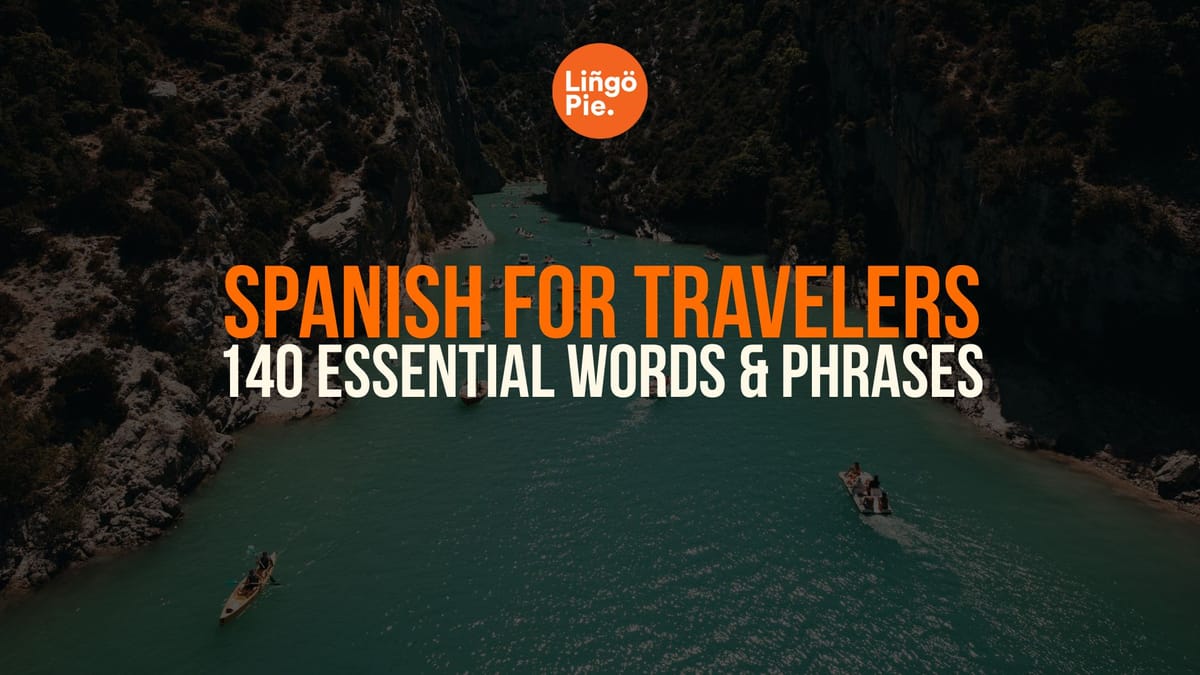You can book flights. You can pack bags. But stepping off the plane into a Spanish-speaking country where you don’t speak the language? That’s another story. Suddenly, every meal, market, and metro ride becomes a guessing game. Learning Spanish for traveling flips that script. It lets you move through cities and conversations with ease, not just as a tourist, but as someone who belongs.
In this post, I’ll share with you English to Spanish words and phrases every traveler needs. I promise that all the expressions featured here are practical and are worth knowing before your next trip.
- Why Memorizing Spanish Words Won’t Make You Fluent
- 14 Spanish Filler Words To Sound Like A Native
- Spanish Curse Words: 20+ Bad Words & Insults Explained

Why learn Spanish before your trip?
Sure, you’ll find some English speakers in Spanish-speaking countries. Hotels, tourist traps, big cities. But step outside the bubble, and English fades fast. Street markets, small towns, taxi rides, even the corner pharmacy, it’s Spanish or nothing.
The good thing is that locals appreciate the effort if you do decide to try your hand at Spanish. Even a few basic words can seriously upgrade your experience. And if things go sideways, knowing the language stops being a bonus and starts being a lifeline.
Navigating
- Navigating airports, train stations, and bus terminals
- Ordering food and drinks the way you actually want them
- Asking for directions without a phone signal
- Handling emergencies (lost passport, illness, police)
- Understanding signs, warnings, and announcements
- Bargaining in markets without getting ripped off
- Making real connections with locals, not just transactions
A little Spanish goes a long way. And sometimes, it goes a very important way.

Greetings And Basic Spanish Phrases
In Spanish-speaking countries, greetings are more than politeness. They set the tone for every interaction. Walk into a shop or approach a stranger, and a simple buenos días or hola shows you’re friendly, respectful, and trying. Skip the greeting, and you risk being seen as cold or rude.
- hola — hello
- buenos días — good morning
- buenas tardes — good afternoon
- buenas noches — good evening / good night
- ¿Por qué?/ Porque - why?
- ¿cómo estás? — how are you? (informal)
- ¿cómo está usted? — how are you? (formal)
- bien, gracias — fine, thank you
- ¿y tú? — and you? (informal)
- ¿y usted? — and you? (formal)
- mucho gusto — nice to meet you
- por favor — please
- gracias — thank you
- de nada — you’re welcome
- perdón — excuse me / sorry
- lo siento — I’m sorry
- ¿cuánto cuesta? — how much does it cost?
- ¿dónde está el baño? — where is the bathroom?
- no entiendo — I don’t understand
- ¿habla inglés? — do you speak English?
- adiós — goodbye
- hasta luego — see you later
- buenas noches — good night

Simple Spanish Questions
In Spanish-speaking countries, people often welcome small talk. It shows curiosity and friendliness. But it helps to know the right questions. Too personal, and it gets awkward. Use them with locals, market vendors, drivers, café staff, fellow travelers.
- ¿cómo te llamas? — what’s your name?
- me llamo [name] — my name is [name]
- ¿de dónde eres? — where are you from?
- soy de [country] — I’m from [country]
- ¿has estado aquí antes? — have you been here before?
- ¿qué me recomiendas? — what do you recommend?
- ¿qué es bueno aquí? — what’s good here?
- ¿cuánto tiempo llevas aquí? — how long have you been here?
- ¿hablas inglés? — do you speak English?
- ¿qué te gusta hacer? — what do you like to do?
- ¿puedes ayudarme? — can you help me?
- ¿dónde está un buen restaurante? — where is a good restaurant?
- ¿qué significa esto? — what does this mean?
- ¿conoces este lugar? — do you know this place?
- ¿qué hay que ver aquí? — what is there to see here?
- ¿te gusta vivir aquí? — do you like living here?
- ¿qué te gusta comer? — what do you like to eat?
- ¿cuál es la mejor playa / museo / bar? — what is the best beach / museum / bar?
- ¿cuál es tu comida favorita? — what is your favorite food?

Asking For Directions In Spanish
Maps only tell you so much. In many Spanish-speaking countries, street signs can be missing or confusing. GPS isn’t always reliable. That’s when speaking up matters. Locals won’t expect perfect Spanish, but they will respond much better if you ask in their language. It’s faster, safer, and often the only way to get where you need to go.
- ¿dónde está [place]? — where is [place]?
- ¿cómo llego a [place]? — how do I get to [place]?
- ¿puede ayudarme? — can you help me?
- estoy perdido(a) — I’m lost
- ¿a cuántas cuadras está? — how many blocks away is it?
- ¿queda cerca? — is it nearby?
- ¿queda lejos? — is it far?
- ¿puede mostrarlo en el mapa? — can you show it on the map?
- ¿hay un banco / cajero automático por aquí? — is there a bank / ATM nearby?
- ¿dónde está la estación de tren / autobús? — where is the train / bus station?
- ¿cómo puedo llegar al centro? — how can I get to the city center?
- ¿en qué dirección está [place]? — in which direction is [place]?
- ¿a qué distancia está? — how far is it?
- ¿está a la derecha o a la izquierda? — is it to the right or to the left?
- ¿hay un baño público por aquí? — is there a public restroom nearby?
- ¿hay un taxi cerca? — is there a taxi nearby?
- ¿dónde puedo tomar un taxi? — where can I catch a taxi?
- ¿cuál es la mejor manera de llegar a [place]? — what’s the best way to get to [place]?
- ¿hay una parada de autobús cerca? — is there a bus stop nearby?

Accommodations In Spanish
Checking in. Asking about amenities. Sorting out problems. You’ll use more Spanish around your hotel or guesthouse than you think. Reception staff might speak English, but cleaners, maintenance, or smaller hotel owners often don’t. The right words help you get what you need without a fuss.
These are the phrases to know:
- tengo una reserva — I have a reservation
- a nombre de [name] — under the name [name]
- ¿hay habitaciones disponibles? — are there any rooms available?
- ¿cuánto cuesta por noche? — how much does it cost per night?
- ¿incluye desayuno? — is breakfast included?
- ¿a qué hora es el desayuno? — what time is breakfast?
- ¿cuál es la clave del wifi? — what’s the wifi password?
- ¿puedo ver la habitación? — can I see the room?
- ¿tienen habitaciones con baño privado? — do you have rooms with a private bathroom?
- ¿hay aire acondicionado? — is there air conditioning?
- ¿puedo pagar con tarjeta? — can I pay with a card?
- necesito toallas adicionales — I need extra towels
- la habitación está sucia — the room is dirty
- no hay agua caliente — there is no hot water
- la llave no funciona — the key doesn’t work
- ¿pueden llamar un taxi? — can you call a taxi?
- ¿puedo dejar mi equipaje aquí? — can I leave my luggage here?
- ¿a qué hora es el check-out? — what time is check-out?
- ¿puedo tener una habitación más tranquila? — can I have a quieter room?

Transportation
Buses, colectivos, metros, long-distance coaches, and the occasional taxi. These are the most common ways to move around Spanish-speaking countries. In big cities, public transport is cheap and packed. In small towns, buses or colectivos (shared vans) are your best bet.
- ¿dónde está la estación de tren / autobús? — where is the train / bus station?
- ¿cuánto cuesta el billete? — how much is the ticket?
- ¿a qué hora sale el próximo tren / autobús? — what time does the next train / bus leave?
- ¿cuál es la próxima parada? — what is the next stop?
- ¿va este autobús a [place]? — does this bus go to [place]?
- un billete para [place], por favor — one ticket to [place], please
- ¿es este el autobús correcto para [place]? — is this the right bus for [place]?
- ¿cuánto tarda el viaje? — how long does the trip take?
- ¿dónde puedo comprar un billete? — where can I buy a ticket?
- ¿puedo pagar aquí? — can I pay here?
- ¿hay un descuento para estudiantes / niños / mayores? — is there a discount for students / children / seniors?
- ¿cuánto cuesta un taxi a [place]? — how much is a taxi to [place]?
- ¿puede llevarme a esta dirección? — can you take me to this address?
- ¿puede esperar aquí? — can you wait here?
- ¿cuánto tiempo tardamos en llegar? — how long will it take to get there?
- ¿hay metro por aquí? — is there a metro around here?
- ¿necesito hacer transbordo? — do I need to change trains / buses?
- ¿cuándo sale el último tren / autobús? — when does the last train / bus leave?
- este no es mi destino — this is not my stop / destination

Emergencies
No one plans for the bad stuff. But a lost wallet, a sudden fever, a broken ankle on uneven cobblestones—these things happen. When they do, language gaps make the stress worse. If you can get even a few words out in Spanish, people will help you faster and more clearly.
- ¡ayuda! — help!
- llame a la policía — call the police
- llame a una ambulancia — call an ambulance
- necesito un médico — I need a doctor
- me siento mal — I feel sick
- he perdido mi pasaporte — I have lost my passport
- me han robado — I have been robbed
- he tenido un accidente — I’ve had an accident
- ¿dónde está el hospital más cercano? — where is the nearest hospital?
- ¿hay una farmacia cerca? — is there a pharmacy nearby?
- tengo alergia a [x] — I’m allergic to [x]
- tengo dolor aquí — I have pain here
- me duele la cabeza / el estómago — I have a headache / stomachache
- necesito un traductor — I need a translator
- ¿puedo usar su teléfono? — can I use your phone?
- ¿puede escribirlo? — can you write it down?
- no puedo encontrar a mi amigo / amiga — I can’t find my friend
- necesito contactar a mi embajada — I need to contact my embassy
- ¿hay un consulado cerca? — is there a consulate nearby?

Dining
Eating out is one of the best ways to experience any Spanish-speaking country, but it’s also one of the moments where language barriers show up fast. In busy local restaurants, menus may not have translations, and waiters might not speak English. If you know how to ask the right questions, you’ll have a better meal and a much smoother experience.
- una mesa para dos, por favor — a table for two, please
- ¿tienen menú en inglés? — do you have a menu in English?
- ¿qué me recomienda? — what do you recommend?
- quiero pedir — I would like to order
- ¿cuál es el plato del día? — what is the dish of the day?
- quiero [dish] — I want [dish]
- ¿qué lleva este plato? — what is in this dish?
- soy alérgico(a) a [x] — I am allergic to [x]
- sin [x], por favor — without [x], please
- con [x], por favor — with [x], please
- ¿puedo tener agua? — can I have water?
- una cerveza, por favor — one beer, please
- una copa de vino, por favor — a glass of wine, please
- ¿puedo ver la carta de postres? — can I see the dessert menu?
- la cuenta, por favor — the check, please
- ¿se incluye la propina? — is the tip included?
- está delicioso — it’s delicious
- estaba muy rico — it was very tasty
- ¿puedo pagar con tarjeta? — can I pay with a card?
- ¿aceptan tarjetas de crédito? — do you accept credit cards?
Why You Should Learn Spanish Phrases
There are a multitude of reasons to learn Spanish, including the job and travel opportunities that having a second language offers you. Moreover, you can enjoy content made for Spanish-speaking people and have fun getting to know new cultures.
You do not need to be fluent to enjoy these benefits. A good level of conversational Spanish will make all the difference to your Spanish travel experiences and employability.
While some people in Spain and South America speak English, you should never assume you will run into them on your travels. The best way to navigate a Spanish-speaking country is with Spanish words and phrases.
Moreover, learning Spanish will help you to understand your own native language. When you learn the grammar of another language, you develop a deeper appreciation for your own vernacular.
Lastly, it feels great to learn a new skill. It is fun to practice Spanish and watch yourself improve. Being able to communicate in a Spanish-speaking country is a real boost to your confidence. So, practice your Spanish travel phrases daily!
When you can speak a second language, the world feels a lot more accessible.
Learn Spanish With Lingopie
If you want to go beyond the basics and actually understand how Spanish sounds in real life (fast, messy, and full of slang), Lingopie makes that easy. With a Lingopie subscription, you can get real Spanish TV shows and smart educational features that'll absolutely help you learn as you watch.
It’s not a classroom. It’s not a textbook.
It’s Spanish the way people actually speak it. Try it out and see how much more natural it feels when it’s time to talk.
,FAQs related to learning Spanish travel phrases
Do I have to learn Spanish to visit a Spanish-speaking country?
You do not have to learn Spanish to visit Spanish-speaking countries but it is recommended to learn some basic Spanish phrases. When you can introduce yourself, ask for directions and order food and drink, your travel experience is enhanced and made easier. Moreover, the locals will appreciate your efforts and be more helpful.
How can I learn Spanish by myself?
You can learn Spanish by yourself by using the available language-learning resources. For instance, by visiting Lingopie online or downloading it to your phone. Lingopie is available on iPhone and Android apps. Moreover, listen to Spanish music and note down useful vocabulary.
How long does it realistically take to learn Spanish?
How long it takes to learn Spanish depends on how long each day you set aside for studying and which methods you use. It is a good idea to use a range of resources and study methods. Moreover, if you choose to sign up for Spanish classes, you may progress faster than learning Spanish alone.






![19 Best Spanish Series For Learning Spanish Fast [2026]](/blog/content/images/size/w300/2025/04/best-shows-to-watch-to-learn-spanish.jpg)
![How to Learn Spanish with News in Easy Spanish [Guide]](/blog/content/images/size/w300/2024/12/How-to-Learn-Spanish-with-News-in-Easy-Spanish.jpg)
![80 Spanish Love Words Every Romantic Should Know [Guide]](/blog/content/images/size/w300/2025/10/spanish-love-words.jpg)
